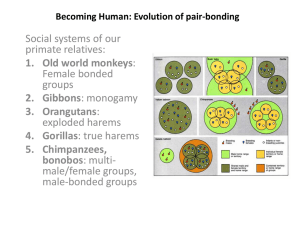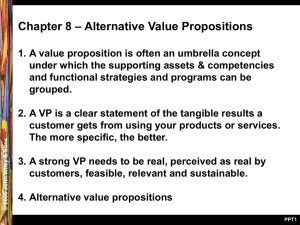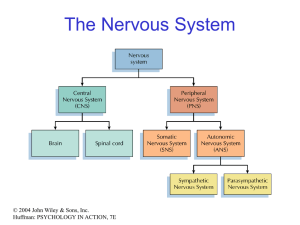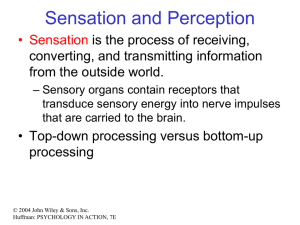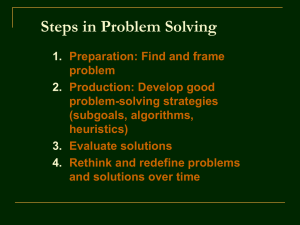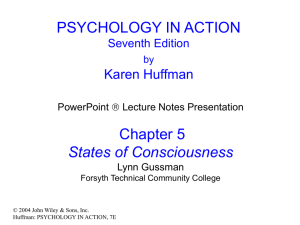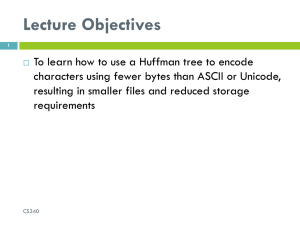Living Psychology by Karen Huffman
advertisement
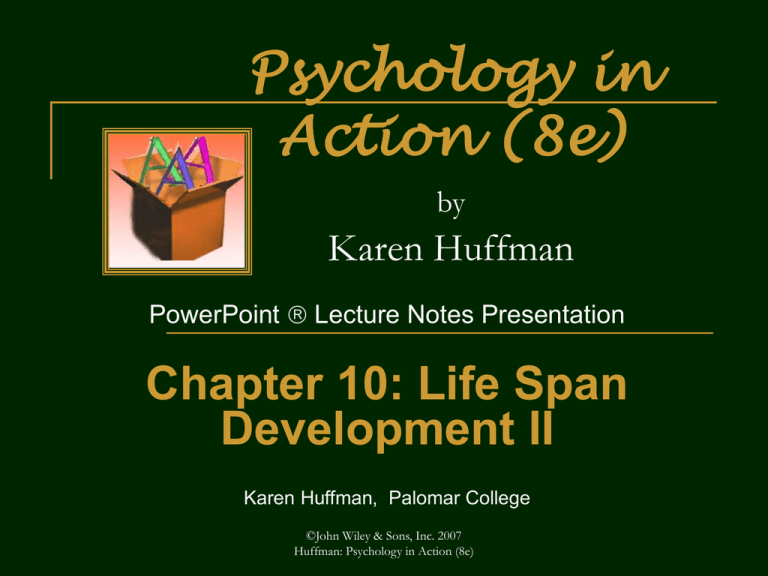
Psychology in Action (8e) by Karen Huffman PowerPoint Lecture Notes Presentation Chapter 10: Life Span Development II Karen Huffman, Palomar College ©John Wiley & Sons, Inc. 2007 Huffman: Psychology in Action (8e) Lecture Overview Moral Development Personality Development Meeting the Challenges of Adulthood Grief and Death ©John Wiley & Sons, Inc. 2007 Huffman: Psychology in Action (8e) Moral Development Kohlberg developed a model of moral development (right and wrong) based on responses to moral dilemmas. ©John Wiley & Sons, Inc. 2007 Huffman: Psychology in Action (8e) The Stealing Dilemma Husband steals medicine to save wife’s life Was it ok or not to steal the medicine and why? Write your answer down ©John Wiley & Sons, Inc. 2007 Huffman: Psychology in Action (8e) Moral Development: Kohlberg’s 3 Levels and 6 Stages PRECONVENTIONAL LEVEL Stage 1: punishment-obedience orientation (ok if not caught) Stage 2: instrumental-exchange orientation (karma – the idea that the universe will owe me if I do good) CONVENTIONAL LEVEL Stage 3: good child orientation (do good to be accepted) Stage 4: law-and-order orientation (I must do good because if everyone broke the law we’d have chaos) POSTCONVENTIONAL LEVEL Stage 5: social-contract orientation (laws can be broken if they do not represent good for the majority) Stage 6: universal ethics orientation (human life has a higher importance than making money ©John Wiley & Sons, Inc. 2007 Huffman: Psychology in Action (8e) ©John Wiley & Sons, Inc. 2007 Huffman: Psychology in Action (8e) Personality Development: Thomas and Chess’s Temperament Theory Temperament: basic, inborn disposition • Three temperament styles: • Easy • Difficult • Slow-To-Warm-Up ©John Wiley & Sons, Inc. 2007 Huffman: Psychology in Action (8e) Personality Development: Erikson’s Eight Psychosocial Stages • • • • • • • • Trust vs. Mistrust (0-1 year) Autonomy vs. Shame and Doubt (1-3 years) Initiative vs. Guilt (3-6 years) Industry vs. Inferiority (6-12 years) Identity vs. Role Confusion (adolescence) Intimacy vs. Isolation (young adulthood) Generativity vs. Stagnation (middle adulthood) Ego Integrity vs. Despair (late adulthood) ©John Wiley & Sons, Inc. 2007 Huffman: Psychology in Action (8e) ©John Wiley & Sons, Inc. 2007 Huffman: Psychology in Action (8e) Pause and Reflect: Critical Thinking Have you successfully resolved the developmental crisis associated with your current Eriksonian stage of life? Are there earlier stages that you may not have resolved successfully? If so, has this affected your personal or social relationships? ©John Wiley & Sons, Inc. 2007 Huffman: Psychology in Action (8e) Personality Development— Myths of Development Myth #1--Adolescence is a time of great storm and stress. Myth #2--Most people experience a midlife crisis in their middle years. Myth #3--Most parents experience a painful empty-nest syndrome when children leave home. ©John Wiley & Sons, Inc. 2007 Huffman: Psychology in Action (8e) Personality Development— Myth of the Empty Nest Syndrome ©John Wiley & Sons, Inc. 2007 Huffman: Psychology in Action (8e) Pause and Reflect: Check & Review 1. 2. George would like to wear two earrings and a black leather studded jacket, but he is worried about others’ disapproval. He is at Kohlberg’s _____ level of moral development. An infant’s inborn basic disposition is known as his or her _____. ©John Wiley & Sons, Inc. 2007 Huffman: Psychology in Action (8e) Meeting the Challenges of Adulthood: Marriage • • • • • • Research shows good marriages: Establish “love maps.” Share power and provide mutual support. Practice conflict management. Share similar values, beliefs, interests, etc. Create a supportive social environment. Maintain a positive emphasis. ©John Wiley & Sons, Inc. 2007 Huffman: Psychology in Action (8e) Meeting the Challenges of Adulthood: Families Important family factors in development: Violence/abuse Teen pregnancy Divorce ©John Wiley & Sons, Inc. 2007 Huffman: Psychology in Action (8e) Meeting the Challenges of AdulthoodWork and Retirement Work How can we find a great career that matches our unique personalities and interests? ©John Wiley & Sons, Inc. 2007 Huffman: Psychology in Action (8e) Meeting the Challenges of Adulthood— Are You in the Right Job? ©John Wiley & Sons, Inc. 2007 Huffman: Psychology in Action (8e) Meeting the Challenges of AdulthoodWork and Retirement Retirement Should we follow the activity, disengagement, or socio-emotional selectivity theory? ©John Wiley & Sons, Inc. 2007 Huffman: Psychology in Action (8e) Meeting the Challenges of Adulthood—The Socioemotional Selectivity Theory ©John Wiley & Sons, Inc. 2007 Huffman: Psychology in Action (8e) Grief and Death 1. 2. 3. 4. Grief is a natural reaction to loss. Four major stages of grief: Numbness Yearning Disorganization/Despair Resolution ©John Wiley & Sons, Inc. 2007 Huffman: Psychology in Action (8e) Grief and Death • • • Cultures interpret and respond to death differently. Different ages also interpret and respond to death according to: Permanence Universality Nonfunctionality ©John Wiley & Sons, Inc. 2007 Huffman: Psychology in Action (8e) Grief and Death (Continued) Kübler-Ross developed a five stage theory of the psychological processes surrounding death: • Denial (“It can’t be true!”) Anger (“Why me? It’s not fair!”) Bargaining (“I’ll change everything!”) Depression (“I’ve lost everything.”) Acceptance (“I know my time is near.”) • • • • ©John Wiley & Sons, Inc. 2007 Huffman: Psychology in Action (8e) Psychology in Action (8e) by Karen Huffman PowerPoint Lecture Notes Presentation End of Chapter 10: Life Span Development II Karen Huffman, Palomar College ©John Wiley & Sons, Inc. 2007 Huffman: Psychology in Action (8e)
